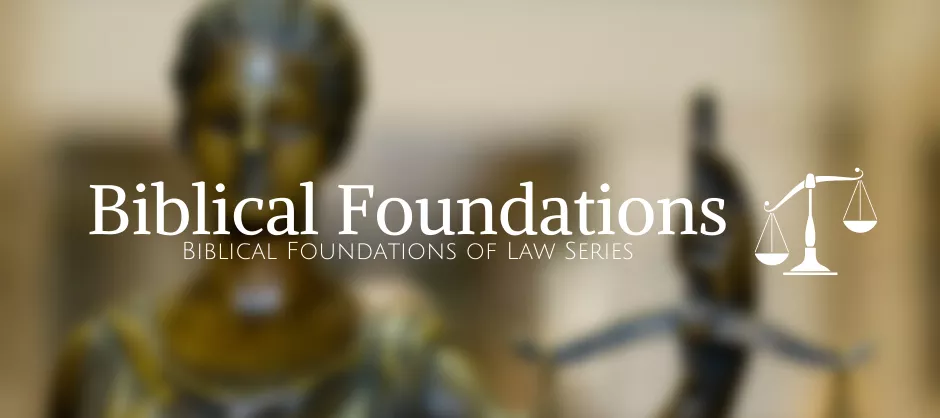
The Biblical Foundations of Law Series
Introduction
The Biblical Foundations of Law studies are intended to provide you with accessible Bible studies on topics of interest to law students and professionals who are seeking to understand the law from a biblical perspective.
After reading the brief scriptural passage (perhaps with a couple of different translations available in the group to add nuances of meaning), use the questions as prods for discussion. Please add your own questions, because the concerns and interests of each study group are different. In some cases, the leader's notes are provided to help guide the conversation.
Some discussion "Do's":
- Do resist the temptation to make Bible study a mere intellectual inquiry or to parade your finely tuned analytical skills.
- Do provoke each other into finding concrete ways to apply and incorporate scriptural insights into your lives.
- Do commit yourselves to encouraging each other to stick to these commitments through friendship and prayer.
We're grateful to the Christian Legal Society for sharing these studies with us.
Link to Studies
- Study 1: Biblical Basics on Human Authority
- Study 2: Torts
- Study 3: Punishment
- Study 4: Conflict and the Call to Law
Study 1: Biblical Basics on Human Authority
Questions
First read Genesis 4:8-16.
- What is the fear that Cain voices in verse 14?
- Why would he have this fear? (Consider, for example, verse 11).
- How does God respond to Cain's fear?
Next read Genesis 9:1-7.
- What is God communicating to Noah in this passage?
- Does it bring to mind similar passages in other parts of Scripture?
- What instruction does Noah receive about those who shed another human's blood? What is the basis for this instruction?
- Has the human role in punishment from murder changed since the time of Cain?
Now read Romans 12:14-13:7.
- What is Paul communicating in the passage from Romans 12? To whom is he speaking? What problems might he be addressing?
- What is the point of the passage from chapter 13? Contrast it with the passage from the end of 12. What are the interesting parallels?
- It appears that the "ruler" in 13:4 is carrying out "vengeance" or "wrath" on other human beings. How does that square with Romans 12:19?
Can we draw any broad conclusions about the source of human law from these passages?
Copyright reserved by the Christian Legal Society. This may be freely distributed in whole or in part, but please keep this notice attached and do not alter the text. Photo of Lady Justice is borrowed from Flickr user jsmoorman.
Study 2: Torts
Intro to Torts
The purpose of this study is to examine the tort law that God gave to Moses for the Israelite society. We will use the case laws in Exodus to examine our own thinking about the goals of our system of tort law. I recommend spending two weeks on this study if the group finds it interesting.
Even if we conclude that these laws in their particulars should not apply today, we can certainly learn from examining principles and goals in the laws God set out for his people at that time and in that culture. This is also good practice as we attempt to get into the habit of evaluating the substance of the law by biblical principles.
Recall from your Torts class the traditional justifications for having a system of tort law in the first place:
- Corrective Justice and Desert: Is this particular plaintiff entitled to receive compensation from this particular defendant, as a matter of fairness and just desert?
- Victim Compensation: Compensation of injured parties is the purpose of the system; other considerations are secondary or tertiary.
- Economic Theory (including pure Deterrence theories): The Tort law is a system of social control, and the goal of the tort law is to set out incentives and disincentives to minimize the cost (to society) of accidents and prevention.
- Power Politics (Critical Race/Feminist Theory, for example): Tort law is a tool to correct an imbalance of power in society. It is a tool of social control, not to provide overall efficiency and safety, but to restore or remove power from particular groups or interests.
Questions
Read Exodus 21:18-22:6, the clearest set of revealed tort law "cases: in scripture. (Notice that these passages are communicated directly from God to Moses to "set before" the Israelites (21:1)). Don't get bogged down in discussing whether these particular rules would or should apply today.
Consider the cases in light of the traditional justifications for tort law:
- Men Quarrelling (21:18)
- The Goring Ox Scenarios (21:28-32)
- The Uncovered Pit (21:33-34)
- The Grazing Cattle (22:5)
- The Spreading Fire (22:6)
With which traditional justification(s) are these cases most consistent? Why would God give such laws to his people? Were there specific problems that these addressed? How do you suppose these laws would be enforced?
Can we draw any broad conclusions about the end or means of tort law from the passages we’ve looked at today?
Leader’s Notes
The idea here is to consider the law of torts from a biblical perspective. We can do that by spending some time thinking and talking about the law that God gave the children of Israel. This law was given directly by God to Moses and is included in the Scriptures. Therefore, we know that it is useful to instruct us.
Don't spend time talking about the continuing applicability of the Old Testament moral, ceremonial, or civil laws (that is worth thinking about, but for another study). The point is to draw general principles. Why does God give this kind of law? What is he trying to accomplish?
I have started with traditional justifications for tort law, because that is the framework by which most law students have learned to examine torts. If it causes your discussion to bog down, just move on to the particular passages.
Remember that there is a context for these laws, too. This was a nomadic agricultural society at the time. But it is never fair to say "Oh, that was just a different culture," without justifying why that might require a departure from a particular approach.
Some things worth noting in the passages if your group doesn’t raise them:
- Men Quarrelling (21:18): He is not "responsible" (for his death? To care for his family?), but he must pay restorative damages. Would this include pain and suffering? ("Loss of time" and...).
- The Goring Ox Scenarios (21:28-32; 35-36): Notice the strict liability versus negligence issues here. There are varying levels of moral culpability with varying degrees of punishment. Also raised is the issue of "damages" for a human life. It appears that there is no payment sufficient for real "damages," yet one can be "redeemed." And the property damage case is treated differently, with damage splitting or damages, depending on level of moral culpability (or that's one possibility).
- The Uncovered Pit (21:33-34): It does not appear to matter whether this is negligent conduct. Or is it always negligent to fail to cover a pit in an agrarian society (with no electricity)? Or is it not about negligence—perhaps this is an example of a different overriding principle: if one causes harm, he pays. This should be a question that you ask throughout the study.
- The Grazing Cattle (22:5): Same issue as the uncovered pit, except the language might allow for a different result in the analysis.
- The Spreading Fire (22:6): Is this activity something that demands a different standard? Or is it the same standard as the other cases?
Copyright reserved by the Christian Legal Society. This may be freely distributed in whole or in part, but please keep this notice attached and do not alter the text. Photo of Lady Justice is borrowed from Flickr user jsmoorman.
Study 3: Punishment
Intro to Punishment
The purpose of this study is to examine principles of punishment with an eye toward thinking through some fundamental principles of the criminal law. This is, again, good practice as you get into the habit of evaluating the law by biblical principles.
This study is based in part on the Jeff Tuomala’s article, The Value of Punishment: A Response to Judge Richard L. Nygaard, 5 Regent U. L. Rev. 13 (1995).
Questions
Read Romans 3:25-26
- What is Paul saying about the atonement in this passage?
- What was God's "demonstration of justice"? Note: Professor Tuomala says that "the supreme demonstration of the principles of justice is found in the doctrine of the atonement. The Christian doctrine of atonement is of singular importance for theories of punishment, as it is the judicial archetype of the way in which God deals with sin and crime." What do you think of this statement?
Read Isaiah 53:5 and 1 Peter 2:24
- Consider the atonement. Was Christ "punished" for our sins?
- Does this tell us anything about the justness of punishing those who do wrong?
Read Romans 13:3-4
- If the civil magistrate is God's agent and minister of "justice," should he look to atonement as a model of how to deal with crime and wrongs? Why or why not?
- What might that entail with regard to punishment? What about rehabilitation? Should rehabilitation be the primary goal of criminal law? Why or why not?
- Are there biblical limits to the use of punishment? What are they? (Consider, for example, Deuteronomy 25:1-3, which seems to indicate at least two important limits, and examples of limitations on the jurisdiction of the power of the state to punish in matters delegated to the church or family).
Read Mark 7:15-23
- What is the root of crime?
- Does this have any bearing on modern principles of the criminal law that you may have learned in class?
Copyright reserved by the Christian Legal Society. This may be freely distributed in whole or in part, but please keep this notice attached and do not alter the text. Photo of Lady Justice is courtesy of: jsmoorman on flickr.
Study 4: Conflict and the Call to Law
Questions
Read Matthew 18:15-17 and 1 Corinthians 6:1-8
- What is God’s heart regarding conflict and the body of Christ?
- Spend some time discussing how lawyers within the body of Christ might serve the kingdom.
- Discuss whether it is acceptable in the sight of God for a Christian lawyer to bring or defend lawsuits in civil courts.
- How will you make the decision about what type of practice you are called to? Consider Ephesians 2:10 as you share with the others in the group.
- Share with the group why you came to law school, and whether you believe that God has “called” you into school or any particular legal field. Why or why not? How did you know what you thought God was asking you to do?
- Discuss what roles lawyers — including you — might have in resolving or reducing conflict in the church or in the broader culture.
Copyright reserved by the Christian Legal Society. This may be freely distributed in whole or in part, but please keep this notice attached and do not alter the text. Photo of Lady Justice is courtesy of: jsmoorman on flickr.
